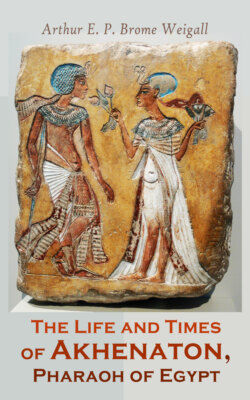Читать книгу The Life and Times of Akhenaton, Pharaoh of Egypt - Arthur E. P - Страница 7
На сайте Литреса книга снята с продажи.
1. THE ANCESTORS OF AKHENATON.
ОглавлениеThe Eighteenth Dynasty of Egyptian kings took possession of the throne of the Pharaohs in the year 1580 B.C., over thirteen hundred years after the buildings of the great pyramids, and some two thousand years after the beginning of dynastic history in the Nile Valley. The founder of the dynasty was the Pharaoh Aahmes I. He drove out the Asiatics who had overrun the country during the previous century, and pursued them into the heart of Syria. His successor, Amonhotep I., penetrated as far as the territory between the Orontes and the Euphrates; and the next king, Thothmes I., was able to set his boundary-stone at the northern limits of Syria, and thus could call himself the ruler of the entire east end of the Mediterranean, the emperor of all the countries from Asia Minor to the Sudan. Thothmes II., the succeeding Pharaoh, was occupied with wars in his southern dominions; but his successor, the famous Queen Hatshepsut, was able to devote the years of her reign to the arts of peace.
She was followed by the great warrior Thothmes III., who conducted campaign after campaign in Syria, and raised the prestige of Egypt to a point never attained before or after that time. Every year he returned to Thebes, his capital, laden with the spoils of Asia. From the capture of the city of Megiddo alone he carried away 924 splendid chariots, 2238 horses, 2400 head of various kinds of cattle, 200 shining suits of armour, including those of two kings, quantities of gold and silver, the royal sceptre, the gorgeous tent of one of the kings, and many minor articles. Booty of like value was brought in from other shattered kingdoms, and the Egyptian treasuries were full to overflowing. The temples of the gods also received their share of the riches, and their altars groaned under the weight of the offerings. Cyprus, Crete, and perhaps the islands of the Ægean, sent their yearly tribute to Thebes, whose streets, for the first time in their history, were thronged with foreigners. Here were to be seen the long-robed Asiatics bearing vases fresh from the hands of Tyrian craftsmen; here were chariots mounted with gold and electrum drawn by prancing Syrian horses; here were Phœnician merchants with their precious wares stripped from the kingdoms of the sea; here were negroes bearing their barbaric treasures to the palace. The Egyptian soldiers held their heads high as they walked through these streets, for they were feared by all the world. The talk was everywhere of conquest, and the tales of adventure now related remained current in Egypt for many a century. War-songs were composed, and hymns of battle were inscribed upon the temple walls. The spirit of the age will be seen in the following lines, in which the god Amon addresses Thothmes III.:—
“I have come, giving thee to smite the princes of Zahi,
I have hurled them beneath thy feet among their highlands....
Thou hast trampled those who are in the districts of Punt,
I have made them see thy majesty as a circling star....
Crete and Cyprus are in terror....
Those who are in the midst of the great sea hear thy roarings;
I have made them see thy majesty as an avenger,
Rising upon the back of his slain victim....
I have made them see thy majesty as a fierce-eyed lion,
While thou makest them corpses in their valleys....”
It was a fierce and a splendid age—the zenith of Egypt’s great history. The next king, Amonhotep II., carried on the conquests with a degree of ferocity not previously apparent. He himself was a man of great physical strength, who could draw a bow which none of his soldiers could use. He led his armies into his restless Asiatic dominions, and having captured seven rebellious Syrian kings, he hung them head downwards from the prow of his galley as he approached Thebes, and later sacrificed six of them to Amon with his own hand. The seventh he carried up to a distant city of the Sudan, and there hung him upon the gateway as a warning to all rebels. Dying in the year 1420 B.C., he left the throne to his son, Thothmes IV., the grandfather of Akhenaton, who at his accession was about eighteen years of age.7
